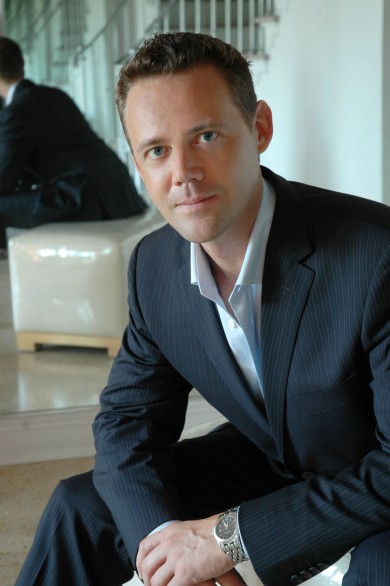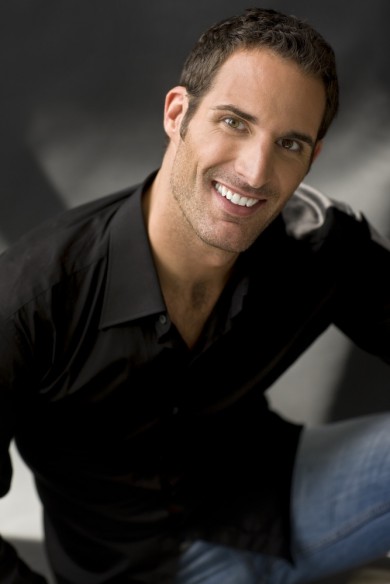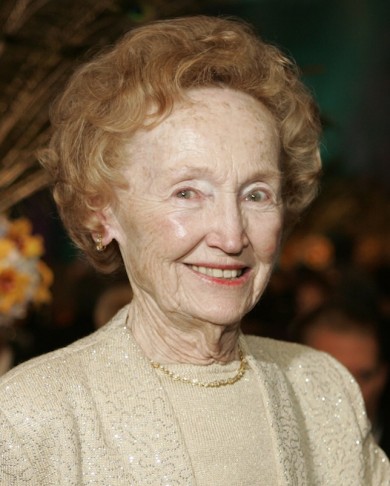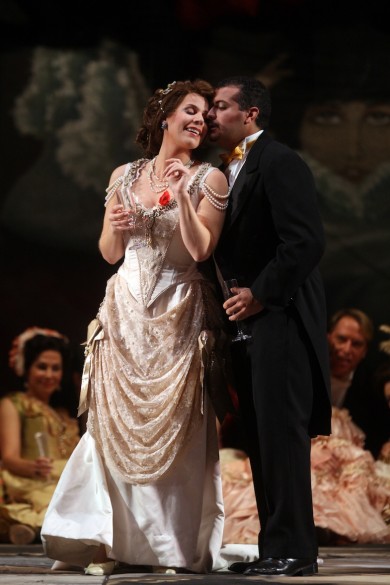In a tough economy, a smaller, tighter Palm Beach Opera opens its 50th season with confidence

Palm Beach Opera presented Massenet's "Thaïs" in 2007 with Georgia Jarman in the title role.
The empty tables at Palm Beach Opera’s pre-opening dinner for Rigoletto in 2008 suggested something was wrong. It turned out something was very wrong, and it would have consequences for the company that continue to this day.
The Bernard Madoff scandal had just become public, and as word of the Ponzi schemer’s crimes spread, many of the opera’s wealthy patrons had more urgent matters on their minds than being feted for their contributions to culture.
“We lost some board members over it,” recalled Daniel Biaggi, the opera company’s general director. “It certainly made it much more challenging to get newer people involved who, before then, might have been much more in a position to be generous to various organizations. There was this general sense in Palm Beach that everybody needed to take a step back and assess what really happened.”
The Madoff scandal and recession struck at a time when the company had reached its highest level artistically, with a fine orchestra, outstanding conducting by artistic director Bruno Aprea and a remarkably high level of singing for a company its size.
As Palm Beach Opera opens its 50th anniversary season Friday with Puccini’s Madama Butterfly, it is a tribute to the company’s artistic and administrative leadership that the quality remains consistently high — often surpassing the work of the longer-established Florida Grand Opera in Miami — despite diminished funding and cutbacks in the number of performances.
Palm Beach Opera’s presence in a mid-sized community with some of the wealthiest seasonal residents in the world makes it unusual among American opera companies, with clear fundraising opportunities but competition from institutions in the wealthy residents’ hometowns up north. Complicating the lives of the opera company’s leaders, the multimillionaires arriving for the winter in Gulfstream jets — or at least first-class seats — bring with them tastes honed at some of the best opera houses in the world.

Daniel Biaggi, Palm Beach Opera general director
“On the one hand we have a group of people who are rightfully very demanding because they do go to the Met, they go to Chicago Lyric, they go to Washington National, they see opera all over the world,” says Biaggi. “So they expect a very high level, artistically speaking, in terms of production values and just in terms of quality.
“And on the other hand, since this is a smaller, regional opera company we may not be able to generate the type of support that someone contributes to when their home base is up north.”
The company’s artistic success caps years of striving. In its early days, the Palm Beach Opera performed at the West Palm Beach Auditorium, a drafty hall known locally as the Leaky Teepee. First-night opera goers — looking like any other Palm Beach crowd dressed to the nines — would pick their way past the remains of the previous night’s circus performance.
The company was often compared unfavorably to the established opera company, especially in Miami. The Miami Herald was particularly tough on the company, as headlines from the 1980s and 90s showed — “Palm Beach Opera Diminishes Macbeth,” “The Elixir of Love Falls Flat,” “Palm Beach Opera’s Creaky Lucia.” The Herald’s then-critic James Roos criticized the company for third-rate singers, a scrawny orchestra, amateurish stage direction and bush-league practices like bringing out a narrator before each act.
But the company worked hard to improve, first under longtime artistic director Anton Guadagno and now under Aprea, a native of Rome who took over in 2005 and invigorated performances with his energetic, nuanced conducting.
Palm Beach Opera gave the belated premiere of Wagner’s Tannhäuser in Florida, with a well-received 2002 production. It turns in well-handled traditional productions of the Puccini and Verdi classics, such as 2007 production of Puccini’s Turandot that was striking for the delicate colors and textures Aprea drew from the orchestra. And the company has used the work of imaginative directors and stage designers whose ideas enhanced the work being performed rather than just providing novelty for its own sake.
A 2008 production of La Traviata used a spare set with a huge angled mirror to reflect the characters’ dual lives. A 2010 production of Don Giovanni swept aside the clichés that have encrusted that opera, giving us a hellish party scene in which white-faced figures in black slowly carry candelabras around the room. Last season the company put on Gluck’s Orfeo ed Euridice in a semi-staged performance that used dancers to substitute for scenery and succeeded because of the expressive voices and charismatic stage personalities of the young countertenor Anthony Roth Costanzo and South Florida native and rising star Nadine Sierra.
Following several seasons of internal upheaval and revolving-door management after Guadagno’s death in 2002, the company also seems to have stabilized administratively after Biaggi’s appointment to the top job in 2008.
Still, Palm Beach Opera’s 50th anniversary season is being marked amid difficult budget cutbacks. The budget peaked in the 2006-2007 season, just before the economy headed south, with about 15 full-time employees and a budget of more than $6.5 million. Today the number of full-timers has dropped to 10 and the budget stands at $4.7 million.
Biaggi says this represents in many ways a healthy fiscal adjustment, since the peak budget years were also years of high deficits. “Already before the economy went down and Madoff happened, in the 08-09 season we were already discussing the fact that we can’t continue that way,” he said. “Honestly I think that’s where we need to stay in order to create stability and longevity.”
In cutting back, the company has ended its Monday matinees and retrenched from four fully staged productions a season to three. But it has found creative ways to compensate, bringing in first-class singers for works that don’t require the expense of staging. This included Beethoven’s Ninth Symphony in 2009 with the soprano Ruth Ann Swenson and bass Morris Robinson, and last season the Verdi Requiem with the celebrated mezzo-soprano Dolora Zajick and the gifted young soprano Angela Meade. And they have kept an evening at the opera affordable. For an art form that’s popularly considered the snootiest in the world, tickets start at a reasonable $20.
The quality of the singing has become a real strength of the company, with a mix of established and promising young performers. This season, for example, the highly regarded soprano Nicole Cabell will star in Gounod’s Romeo et Juliette.
Biaggi, former associate director at Guy Barzilay International Artist Management in New York, attributes the company’s success in luring quality singers to connections he and his artistic staff have developed in the opera world, as well as Palm Beach Opera’s reputation as a singer-friendly company in a nice place to spend December or January.
“I think a lot of the singers know that we really like to take care of them when they’re here,” he said. “Everybody’s nice, we’re a good company. They’re treated well. Their fees may not be as high as they get somewhere else but it’s a good experience, it’s a good company, it’s beautiful surroundings. Obviously being in Palm Beach over the winter instead of being in Chicago in the snow also helps.”

James Valenti Photo: Dario Acosta
The American tenor James Valenti, who sings Pinkerton in this weekend’s production, moved to West Palm Beach from New York City two years ago after experiencing the area while singing twice before with the company, once as Pinkerton, and then as the Duke in Rigoletto.
“I love this company. I love the area and the people, Daniel and Maestro Aprea,” he said. “They treat you with respect and appreciate what you do. Maestro Aprea is always very effervescent, and seems excited about the process. He’s very old school and he has strong ideas of what he wants but he’s very sympathetic to singers.”

Helen Persson. Photo: Richard Graulich
Helen K. Persson, whose name should be familiar to any opera fan in Palm Beach for the numerous performances she has sponsored, said the company has improved enormously just in the past few years.
“Up until the past three years, we’ve had moderate success with singers and things like that,” she said. “But for the last three years, with Biaggi we’ve had excellent singers, Metropolitan Opera types. The members of the company that produce the opera know their stuff and they choose singers that get the audience spellbound in a performance, and that’s the greatest success.”
But she said she is disappointed with the level of financial support shown to the company by the enormously wealthy residents of Palm Beach and the surrounding communities, as well as by some members of the company’s board.
“I’m not that wealthy, but I manage, and I really support the opera a lot,” said Persson, who lives in North Palm Beach. “I want it to be successful. We have in Palm Beach some of the richest people in the world. And yet we don’t have their support. We don’t have the support of those people that can help us. I don’t know why.”
And she said not all members of the board are doing enough. “We have a lot of board members that really shouldn’t be on the board because first of all they don’t know the rules of what is expected of a board member. They love being board members. They love to tell other people that they’re board members. They should be supportive monetarily. Why get on the board if you’re just going to sit there and say ‘I’m a member of the board’?”
The company will celebrate its 50th anniversary with two Golden Jubilee performances Jan. 20 and 22, featuring scenes from La Traviata, Die Fledermaus, La Boheme, Carmen, Aïda and other works. Hosted by the legendary American baritone Sherrill Milnes, the concerts will include performances by the soprano Ruth Ann Swenson, mezzo-soprano Denyce Graves-Montgomery and tenor Brandon Jovanovich, among others.
The selection of scenes reflects the mainstream repertoire on which the company has focused. A tally of works performed since 1962 shows the most frequently performed opera was La Bohème, produced in eight seasons, followed by seven seasons each for La Traviata, Tosca and Madama Butterfly (counting this week’s performances), then Rigoletto performed in six seasons, five seasons each for Carmen and Don Giovanni, and four seasons each for Lucia di Lammermoor, Die Fledermaus and Aïda.
Biaggi said he would like to see the company undertake more wide-ranging repertoire, including American opera and the works of Benjamin Britten. “Even when I was still working in New York, everyone knew that Palm Beach Opera was predominantly Italian and French repertoire, every now and then a German or a Russian,” he said. “But nobody looked to Palm Beach to put on American opera or 20th century works or chamber or baroque opera. I think that continues to a certain extent, but that’s exactly where we’re trying to branch out.”
He sees this happening as part of a larger branching out of the opera company into performances in the community, with universities, in other cities and outdoors.
“I would love to be able to do much more family-oriented programming, with family-appropriate repertoire,” he said. “So far we’ve always had our big flagship family performance at the Kravis as a 90-minute version of something we’re already doing. But there are a lot of wonderful pieces that have been written really with the family audience in mind.
“I think every opera company today is realizing that in order to have the civic impact on the community that it would like to have, we have to take more things out of the opera house.”
Palm Beach Opera’s production of Madama Butterfly runs Friday through Sunday at the Kravis Center for the Performing Arts in West Palm Beach. pbopera.org, 561-833-7888.

Palm Beach Opera presented a memorable "La Traviata" production in 2008 with a huge angled mirror behind the singers (Georgia Jarman and Gaston Rivero).
Posted in Articles
Leave a Comment
Tue Dec 13, 2011
at 3:31 pm
No Comments






